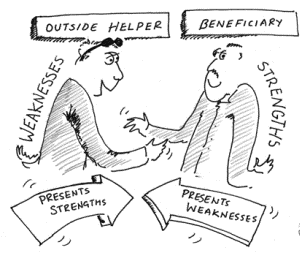by Jean Johnson
According to Don Cormack, the author of Killing Fields, Living Fields, the Protestant Church in Cambodia grew in the 1950s and early 60s to two thousand people. At this point foreign organisations that had been supporting the young churches decided it would be strategic to withdraw financial support so the churches would learn to use their own resources to sustain themselves and grow. It didn’t take long for the majority of church workers to abandon ministry to find better paid employment elsewhere.
About three hundred Christians remained. From 1965, the church began to grow and strengthen again, but this time on a healthier foundation. Church leaders like Pastor Yeah were determined that the Khmer church should never slip back into a state of dependence, but rather manage its own affairs from this point forward.
Ten years later came genocide and civil war, and most Christians were killed by Pol Pot’s regime.
Relief agencies to the rescue…
During the time of rebuilding in the 1990s, Cambodia became like a magnet, drawing relief agencies, humanitarian organisations and missionaries. I was one of them! I entered Cambodia in July 1992. Unfortunately, I never heard Pastor Yeah’s strong encouragement to allow the Cambodian church to manage and financially support its own affairs.
I went right to work managing and financially supporting the church of Cambodia. I distributed my share of handouts, paying rent for churches, providing resources, building others’ buildings, taking leadership positions, importing foreign ways of doing things and modelling methods of ministry that could not easily be copied or handed on to local leadership. Although I had training in cross-cultural work, I leaned more on my experiences in America. These actions led to creating psychological and financial dependency among those I worked with.
Dependency
Dependency is like a spider with many far-reaching tentacles, creating all sorts of ‘life-sucking’ problems among local churches, organisations and communities, such as:
- loss of dignity and self-worth
- lack of motivation
- stifled creativity
- very little local giving
- unwillingness to support local leaders
- jealousy, competition, mixed motives
- undermining local value systems
- lack of people willing to be volunteers
- lack of credibility because locals are perceived as hirelings of foreigners
- being perceived as foreign-driven
- stunted growth.
Having travelled to various countries, read many books and articles on the subject and talked with others involved in cross-cultural work, I believe this pattern of dependency is not a unique problem to Cambodia. Outside resources can actually become a stumbling block for local growth and multiplication.
For example, money, supplies and gifts are shared generously from foreign Christian workers among those they consider poor and needy. Although the assistance does help people get what they need, a deeper mindset is being formed within the people: ‘We are weak and it will always be this way.’ Fatalism becomes their identity.
Help that hinders
I have a saying that guides my work, ‘Day 1 affects day 100’. In other words, what we do from the very beginning will either hold back multiplication or enhance it within each particular cultural context. I have learned that I cannot transfer vision, psychological ownership, and the capability to sustain and multiply to the local church; rather, I need to affirm and model these things from the beginning onward.
Jean Johnson worked in Cambodia for 16 years. She now works with World Mission Associates, promoting church sustainability and multiplication. She is author of the book We Are Not the Hero.









